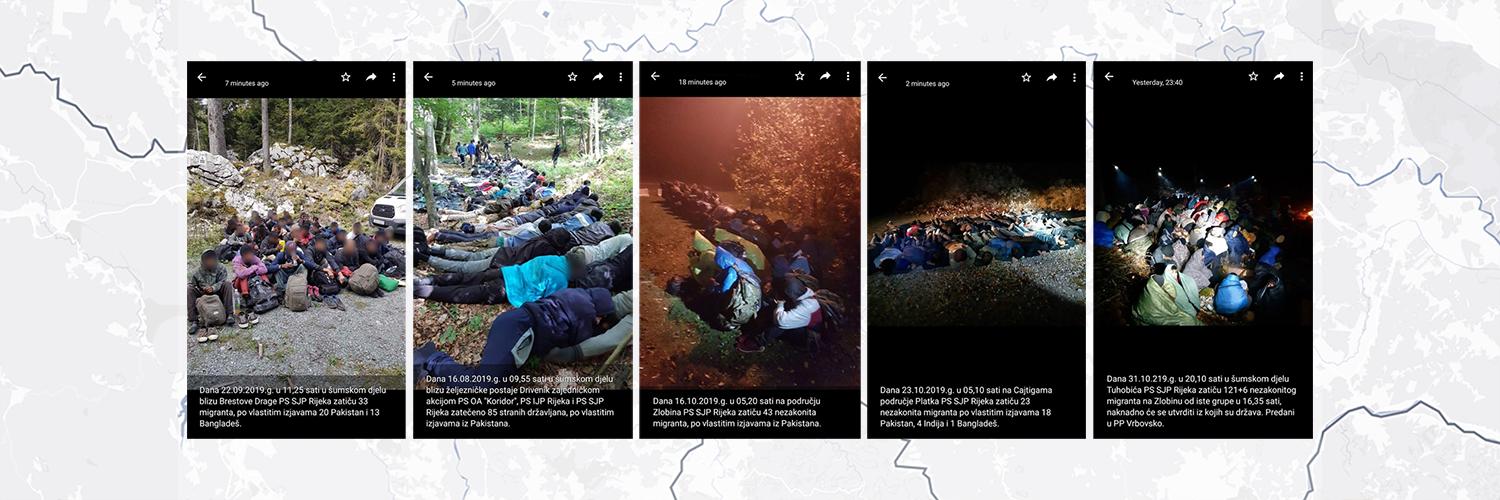
Inside Croatia’s Secret WhatsApp Group
How high-ranking Croatian officials presided over clandestine communications about border operations
When Lighthouse Reports filmed and published footage in 2021 of Croatian police officers in black balaclavas beating refugees while illegally forcing them back across the border into Bosnia and Herzegovina, the victims’ sharp screams echoing through the forest, the Croatian government was quick to evade responsibility.
The illegal treatment, Croatian Interior Minister Davor Božinović assured, was an isolated case. The police officers responsible had not acted on the instructions of the government, and neither ministers nor police chiefs had known anything about it, he claimed.
Migration experts, asylum lawyers and human rights activists were sceptical. They suspected that high-ranking Croatian officials knew about the pushbacks, which took place under a police operation known as ‘Korridor’ – which is partially financed by the EU – and that perhaps they even ordered them.
Now we, in collaboration with Der Spiegel, Nova TV, Novosti weekly, Telegram news portal and ORF, have obtained evidence indicating that these suspicions were correct – in the form of leaked WhatsApp communications.
Screenshots leaked to Lighthouse Reports and partners reveal that top Croatian officials have presided over a clandestine WhatsApp group called ‘OA Koridor II- Zapad’, in which Croatian border police shared sensitive information about apprehensions of foreign nationals, including disturbing photographs, between August 2019 and February 2020.
Croatia has always denied any knowledge of violent & illegal operations by its own police forcing people seeking asylum back out of the EU
Now we can reveal that top Croatian officials were part of a secret WhatsApp group where such activities were shared & encouraged pic.twitter.com/K8CrBSFN8K
— Lighthouse Reports (@LHreports) April 6, 2023
According to government reports, OA Koridor II Zapad was or is one of several sibling operational actions in Croatia “related to combating irregular migration and crimes related to smuggling of people”. Police sources said the violent pushbacks we filmed in 2021 took place under another one of these operations.
The WhatsApp group sat outside any official means of communication and away from the usual monitoring procedures, and there are strong indications that the foreign nationals referenced in the messages went on to be subject to illegal pushbacks.
METHODS
An analysis of the 60 screenshots we received found that there were 33 participants in the WhatsApp group, and we were able to establish the identity of just over two-thirds of them, partly by using digital forensics software such as Pipl and Maltego, which enable the search of various websites where these numbers were used for registration.
We found that among them were Croatian high-ranking officials including the head of border police Zoran Ničeno and head of the public relations department Jelena Bikić, who reports directly to Minister of Interior Božinović.
The WhatsApp group was used to exchange information about apprehensions of more than 1,300 people of mostly Afghan, Pakistani and Syrian nationality. These messages were often accompanied by photos of the individuals, their faces clearly visible, in some cases being forced to lie face down on the ground or remove their shoes.
Experts and police sources told us that sharing such information on a privately-owned platform such as WhatsApp breaches multiple police regulations. They also said they believed the group was likely used to unofficially document the apprehension of migrants who were systematically pushed back across the border in breach of Croatian and European law, in order that there was no trace of this action.
STORYLINES
In one WhatsApp message, the head of border control in Zagreb police administration can be seen saying he had asked on the evening of 13 February 2020 for five police vans to carry out “odvraćanje” after apprehending a group of 80 migrants. Odvraćanje is the Croatian word for “rejection” or “deterrence”, which is said to have become a code word for pushbacks in recent years. Police sources and experts are clear in saying that this message indicates that an illegal pushback was taking place.
We spoke to a Pakistani man who gave testimony of a pushback to a volunteer from the Border Violence Monitoring Network, a grassroots coalition, back in 2019. We were able to match this, with a high degree of confidence, to a message in the WhatsApp group from August 2019 describing the apprehension of 85 foreign nationals. In his testimony, taken the day after the arrest, the man reported that the group was pushed back, with violence used against some of them, and not given the chance to claim asylum. We spoke with him last month and while he said he couldn’t remember the exact date, he recognised the scenario and one of the individuals seen in the photo.
On multiple occasions, the WhatsApp group also was used to exchange information about journalists visiting the border area. In one case, the group’s members were informed that Bernt Koshuch, a journalist from Austrian broadcaster ORF, had been spotted in the wider area of Cetingrad, and a photo was shared of him and a colleague. Mr Koschuch confirmed to us that he had been in the area at that time. He later joined our investigation.
Croatia’s Korridor operations benefit from European funding, with millions of euros flowing to Zagreb each year and EU states paying for overtime, accommodation and food for Croatian border guards – yet to date, the EU has not initiated any infringement proceedings against the country. “The current silence, impunity and even implicit encouragement by the Commission and other member states, only fuel these gross violations against vulnerable people in search of protection,” says MEP Tineke Strik.
Bodo Weber, senior associate at the Democratisation Policy Council in Berlin, said: “Overall, this group confirms what I have been researching for several years and other observers have long suspected: The Croatian police’s well-documented pushback campaign is clearly being directed from within the Ministry of Interior.”
To keep up to date with Lighthouse investigations sign up for our monthly newsletterO

